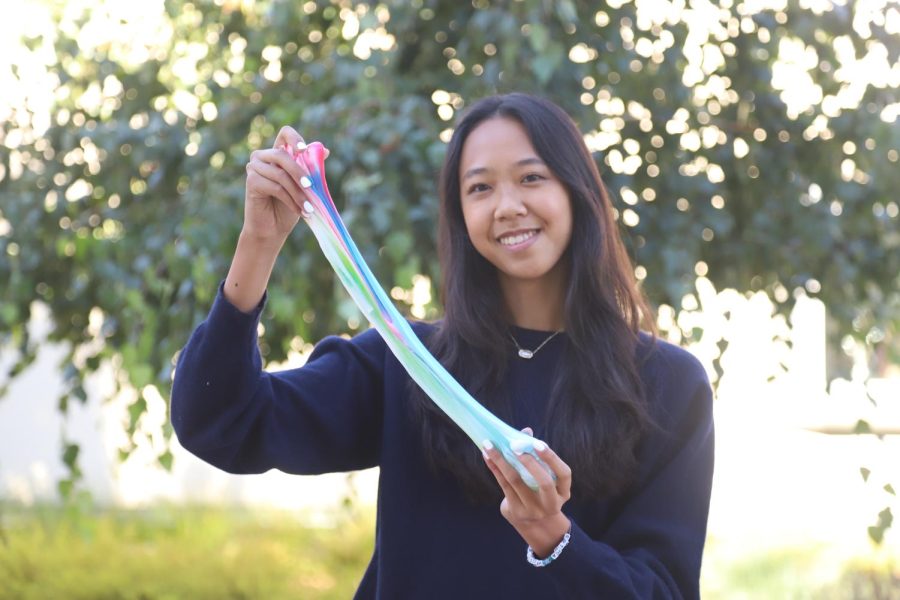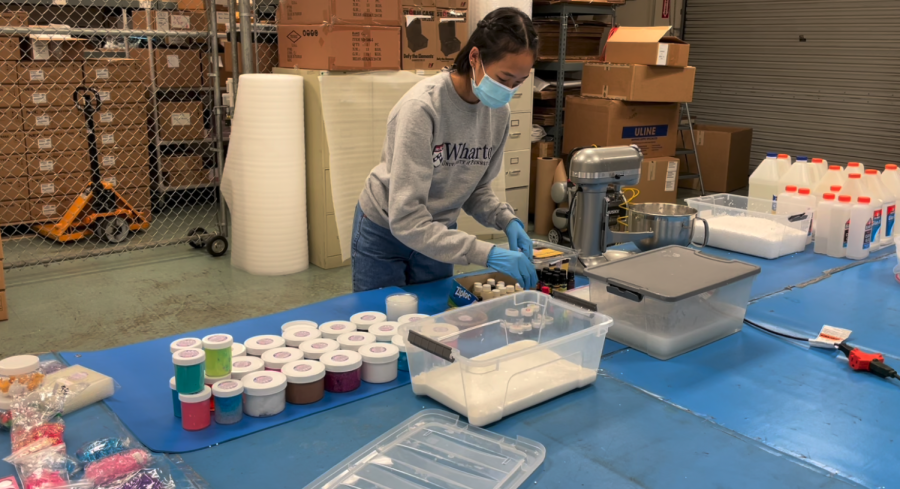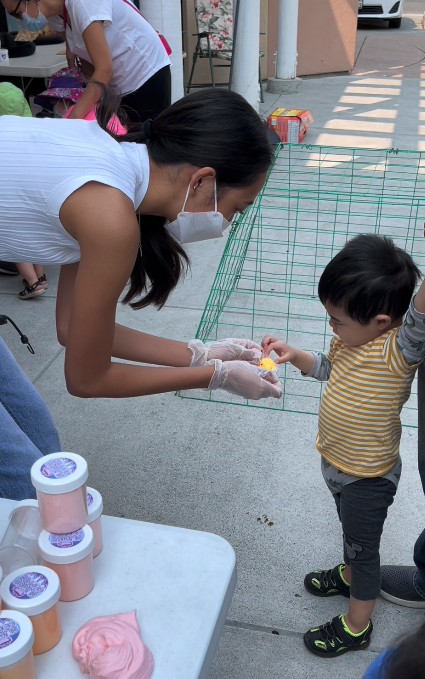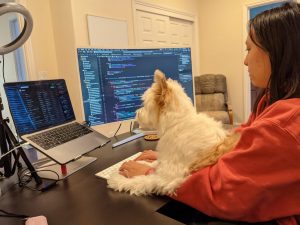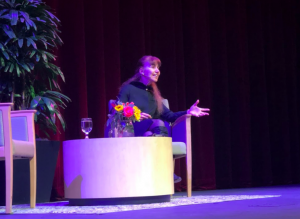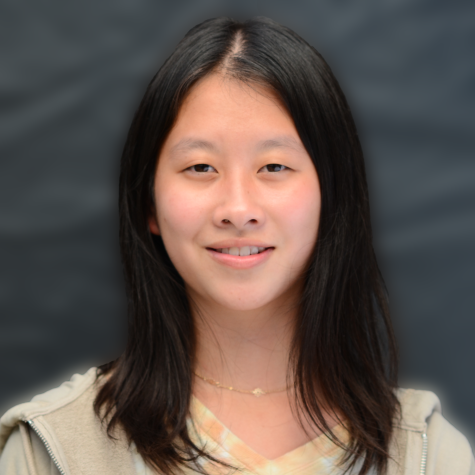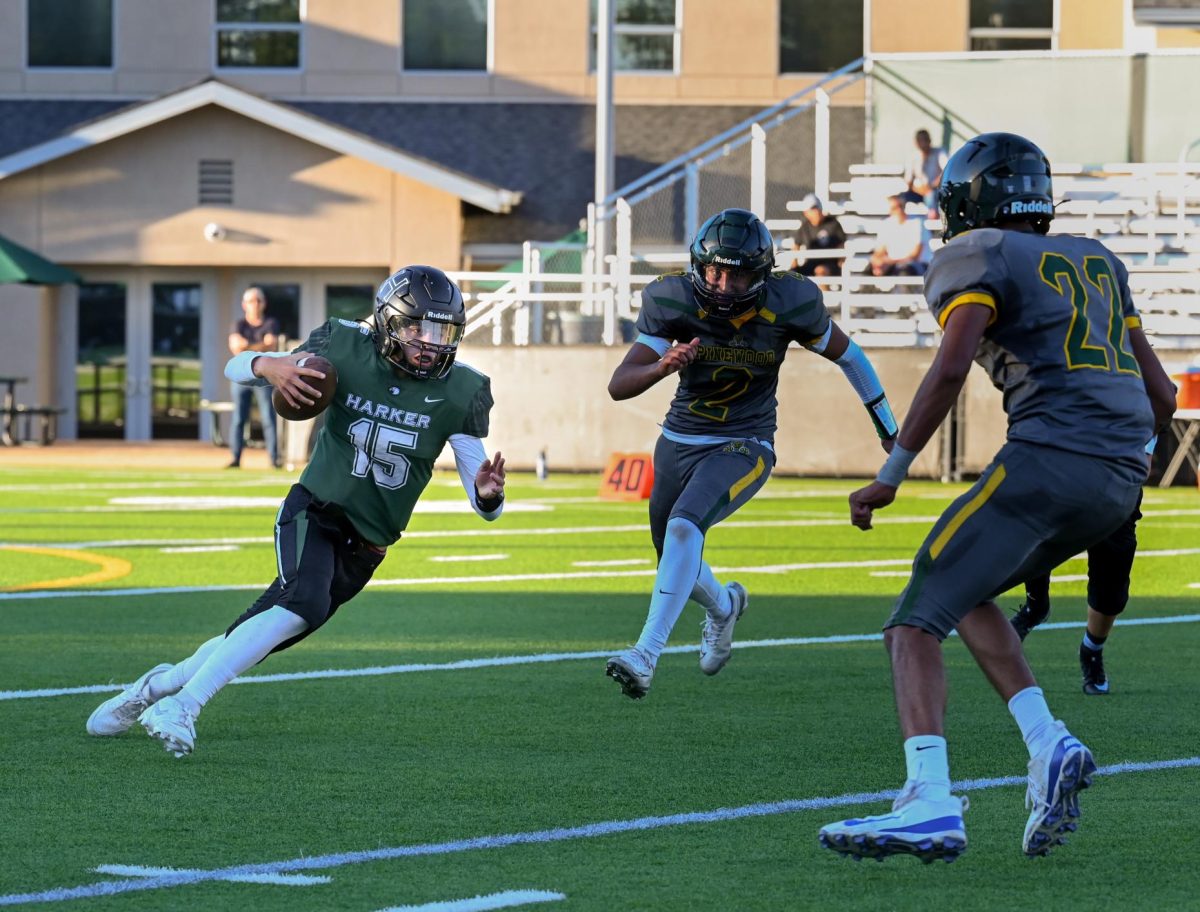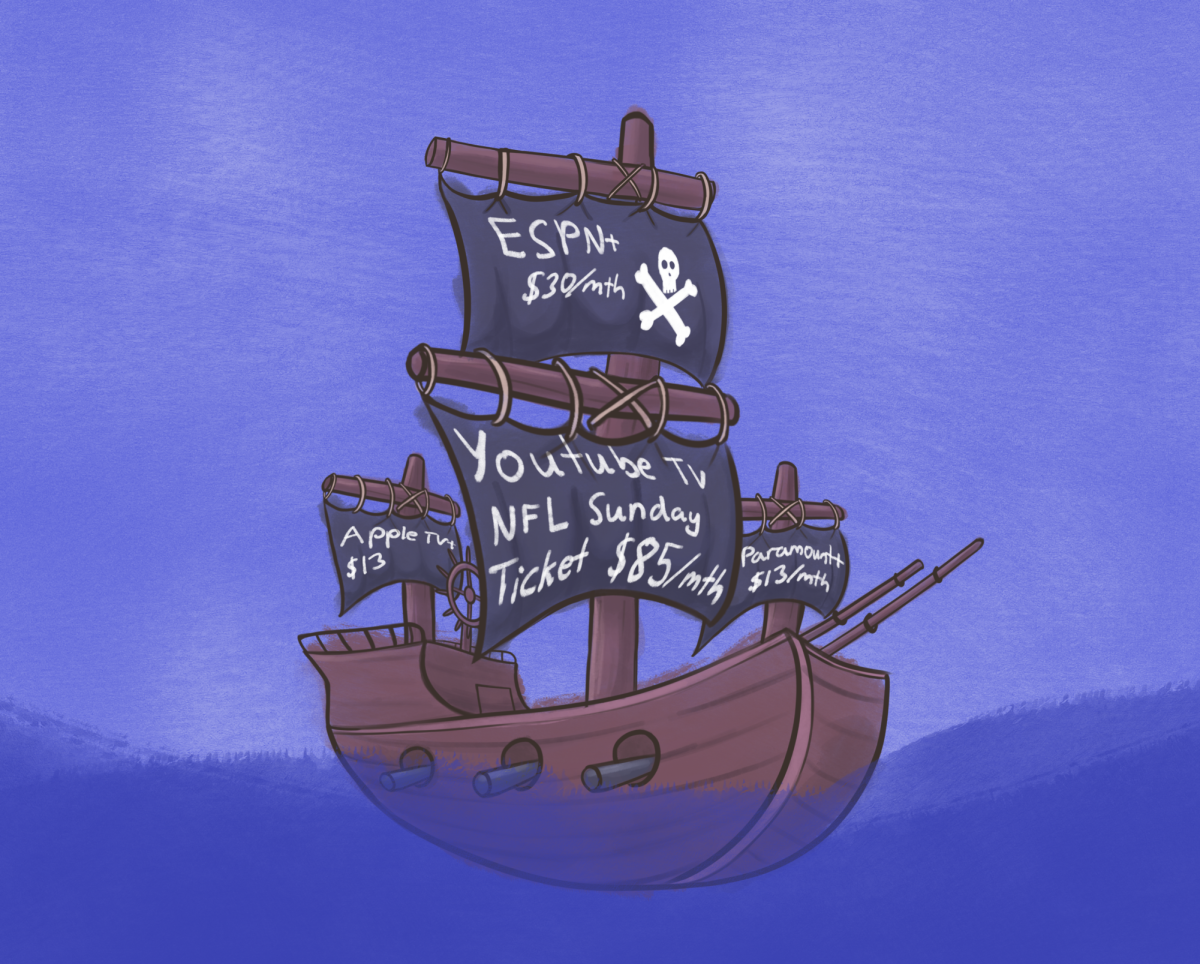Slime and stickers for sale: Students take charge through small businesses
Andrea Thia (12) stretches some rainbow-colored slime, produced by her small business. Andrea started a slime business, Slimee Coffee in eighth grade, now with over 3,000 sales.
October 18, 2021
Andrea Thia (12) started her slime business at the age of 13, a mere eighth grader in a world of massive firms and experienced corporations. She had been selling hand-made slimes to her friends and classmates and soon realized she could make a profit from all her sales. Eventually, her passion for creating led to the founding of Slimee Coffee, an online slime store, now with over 3,000 sales.
Though originally created to supply slime to consumers, Andrea began to tackle a social cause that her business could greatly benefit, specifically using slime as part of sensory therapy for autistic children.
“I realized there was a whole neurodivergent community out there that was struggling and that I had a product that could help them [through sensory therapy],” Andrea said. “Because so many people near me are impacted by autism, I decided to shift my focus and take on a social cause to why I’m running this business, so I found that partway more fulfilling than just selling slime.”
As a result, Andrea has experimented and tested with different slime formulas and textures, researching which one would work best as sensory therapy mediums for autistic children. Currently, she supplies slime to two local organizations for autistic and neurodivergent children, Magic Dance Arts and Cultivate Music Studio. She also recently provided slimes to an event for autistic children, where children could interact with different textures.
Along with pursuing a social cause, Andrea has expanded her small business, from working by herself at her home to now, a warehouse, and three part-time employees, making the transition due to both sanitary and space issues. At the warehouse, they manufacture slime in two mixers, then package and ship out all of their products.
Because of the number of sales and popularity of Slimee Coffee, Andrea has needed to figure out balancing school work and her business, one of the main challenges she has faced with the business. She’s worked out a routine for herself: going to the warehouse every Friday, and making large batches of slime, then printing out the shipping labels and invoices before packaging and shipping them out.
“People may assume that it’s fun and it’s something that I do everyday after school, but it takes so much time; it can easily take up 20 hours a week,” Andrea said. “But it’s honestly such a rewarding and fulfilling experience [that] I wouldn’t trade it in for anything.”
Throughout her journey, Andrea has also received joys after all her hard work, especially through directly seeing children actually use her products. She’s also found out through her journey how supportive her family has been through it all, and the passion she has for her small business.
“Seeing kids play with my slime in front of me is, honestly, so rewarding, and it’s seeing the impact that I’m able to make and do something that I myself am passionate about and enjoy,” Andrea said. “it’s] just an awesome way to work with [children], and learn lessons from [children], and meet new people and work with new people.”
Moving forward, Andrea hopes to continue to expand Slimee Coffee and work more on marketing through social media. Check out Slimee Coffee’s Etsy shop here and Instagram page here.
Helping others also emerges in Arnav Gupta’xs (12) online business, Get Well Soon, which connects patients with available clinical trials. Since founding Get Well Soon around three years ago, Arnav and his team have now produced a number of products for finding clinical trials or recommending trials.
According to Arnav, creating treatments for diseases takes an average of 10 years to develop, progressing through many years and stages of clinical trials. His business and products aim to speed up this process: by allowing patients to rapidly browse through over 300,000 trials and enroll in them, then the scientists running the trial, clinical trial sponsors and patients would all benefit from the expedited treatment process.
Arnav started the business through a prototype app in ninth grade, founding Get Well Soon because of an experience where he himself was searching for clinical trials, yet unable to browse through and organize all of the information.
“[The idea for Get Well Soon was] based on a personal experience in which I have a rare genetic disorder. and I was searching for treatment,” Arnav said. “Really, that’s where it started, that it was hard for me to find a clinical trial, and all clinical trials were scattered on various sources of clinical trial sources. Out of that experience I decided to create an app to help connect patients to clinical trials, and since then, it’s expanded.”
Arnav developed his business through taking both the Incubator 1 and Incubator 2 classes his sophomore and junior years. In the Incubator 1 course, students plan out ideas and structure their businesses, then market and launch them. In the Incubator 2 course, students who already have products or services work in an independent study are given mentorship and funding to develop their business goals. Arnav benefited from a mentorship with someone at a pharmaceutical company, learning about marketing and how to connect with the trial and sponsor side of the process.
Now, Get Well Soon has expanded to more products with a team of people, ranging from software engineers to high school students like Arnav. The team is currently working on a patent for their trial recommender product, which recommends a trial from their database of millions of trials to patients automatically by analyzing the patient’s online health record.
So far, Arnav has enjoyed both market research and speaking with all the people in the process of clinical trials, like those at pharmaceutical companies and patients seeking trials. He has also learned more about the importance of his business and the impact it could potentially have on many people.
“I learned that it’s a much more large scale issue,” Arnav said. “If we could get this to work the way we want to, we could potentially affect billions of people around the world, which is really motivating and really meaningful. It is a product that speeds up the cures and treatments for a lot of different diseases including cancer, diabetes that affect lots of people.”
Next, Arnav aims to talk and convince more investors to raise funds to boost the initial stages of their new products and have more patients start using their products, to create an impact in the future. Check out Get Well Soon’s website here and Facebook page here.
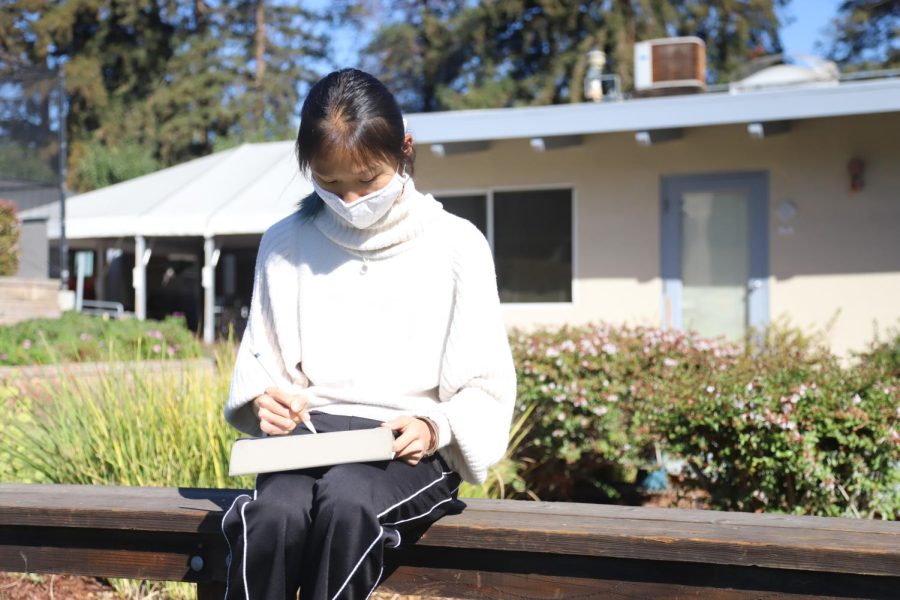
On another side of the spectrum, junior Ashley Ruan’s joint-small business just began to blossom, with her first pre-order launch on Sept. 30. Ashley partnered with a friend, college student Helen Jiang, this past summer on an initiative to start Deobi Crossing, a small stationery business, based on characters from the K-pop band The Boyz. The shop sells items like stickers, pins and washi tape with illustrated designs printed on them.

Ashley works on these designs, sketching the colorful animals on her iPad, such as the penguins eating watermelon on one of their washi tape products. Then, Helen searches for manufacturers to actually produce their products. Since Ashley enjoys drawing and designing, this business doesn’t impede her schoolwork.
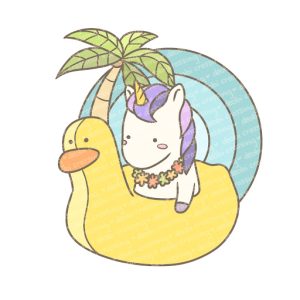
“I usually just draw a little bit in my free time, so it’s kind of a way for me to relax from my schoolwork as well, so it doesn’t feel hard,” Ashley said. “This isn’t a burden on top of my schoolwork.”
Sometimes, Ashley struggles with drawing and artist’s block, with difficulties of finding an aesthetic design or perfecting the illustrations of some animals. However, like Andrea, numerous returns reward her through the business, as she enjoys seeing the physical versions of her designs.
“I really like the fact that I’m able to turn my art into products, like I’m able to see my art printed out on rolls of tape, or as a keychain, which is pretty gratifying,” Ashley said.
Ashley would like to work on more washi tape and pin designs and is hoping to ship over some samples and expand the shop to Etsy. Check out Deobi Crossing’s pre-order site here and their Instagram page here.
Upper school business and entrepreneurship teacher Michael Acheatel has directly interacted with students and their small businesses over the past years through teaching the Incubator 1 and Incubator 2 courses.
Acheatel finds that running businesses develops a variety of skills, some hard skills such as developing marketing plans, organizing funding and pricing, presenting their product successfully, which are useful in the business field. On top of that, students learn soft skills like leadership, resilience and problem-solving that are useful in many aspects of one’s life. Acheatel believes that entrepreneurship can teach and help students develop these skills, potentially more successfully than just in a classroom.
Along with allowing students to grow different skills, Acheatel believes that the course allows students’ passions to shine through. He says that no matter what aspect of their business students are working on, they approach it with an excitement and passion to learn and grow which is his favorite part of teaching the course, such as through mentoring students like Arnav.
Yet another aspect of the course Acheatel enjoys is students seeing responses to their businesses in real time. Instead of waiting for teachers to grade tests or assign homework, students can see responses from customers in real time about their marketing strategy or product. Acheatel advises students who may be considering taking the course or starting a small business of their own to take the opportunity as a high schooler, where there is not as much of a risk with launching a business, and students can develop more skills.
“Now is such an exciting time for students to take the risk of starting a business, because you don’t have a mortgage, you don’t have your kids’ college education that you’re saving up for,” Acheatel said. “Students can learn a lot of amazing entrepreneurship lessons, life lessons, hard and soft skills, learning through failure, just like their more seasoned entrepreneurial counterparts.”


















![“[Building nerf blasters] became this outlet of creativity for me that hasn't been matched by anything else. The process [of] making a build complete to your desire is such a painstakingly difficult process, but I've had to learn from [the skills needed from] soldering to proper painting. There's so many different options for everything, if you think about it, it exists. The best part is [that] if it doesn't exist, you can build it yourself," Ishaan Parate said.](https://harkeraquila.com/wp-content/uploads/2022/08/DSC_8149-900x604.jpg)




![“When I came into high school, I was ready to be a follower. But DECA was a game changer for me. It helped me overcome my fear of public speaking, and it's played such a major role in who I've become today. To be able to successfully lead a chapter of 150 students, an officer team and be one of the upperclassmen I once really admired is something I'm [really] proud of,” Anvitha Tummala ('21) said.](https://harkeraquila.com/wp-content/uploads/2021/07/Screen-Shot-2021-07-25-at-9.50.05-AM-900x594.png)







![“I think getting up in the morning and having a sense of purpose [is exciting]. I think without a certain amount of drive, life is kind of obsolete and mundane, and I think having that every single day is what makes each day unique and kind of makes life exciting,” Neymika Jain (12) said.](https://harkeraquila.com/wp-content/uploads/2017/06/Screen-Shot-2017-06-03-at-4.54.16-PM.png)








![“My slogan is ‘slow feet, don’t eat, and I’m hungry.’ You need to run fast to get where you are–you aren't going to get those championships if you aren't fast,” Angel Cervantes (12) said. “I want to do well in school on my tests and in track and win championships for my team. I live by that, [and] I can do that anywhere: in the classroom or on the field.”](https://harkeraquila.com/wp-content/uploads/2018/06/DSC5146-900x601.jpg)
![“[Volleyball has] taught me how to fall correctly, and another thing it taught is that you don’t have to be the best at something to be good at it. If you just hit the ball in a smart way, then it still scores points and you’re good at it. You could be a background player and still make a much bigger impact on the team than you would think,” Anya Gert (’20) said.](https://harkeraquila.com/wp-content/uploads/2020/06/AnnaGert_JinTuan_HoHPhotoEdited-600x900.jpeg)

![“I'm not nearly there yet, but [my confidence has] definitely been getting better since I was pretty shy and timid coming into Harker my freshman year. I know that there's a lot of people that are really confident in what they do, and I really admire them. Everyone's so driven and that has really pushed me to kind of try to find my own place in high school and be more confident,” Alyssa Huang (’20) said.](https://harkeraquila.com/wp-content/uploads/2020/06/AlyssaHuang_EmilyChen_HoHPhoto-900x749.jpeg)




